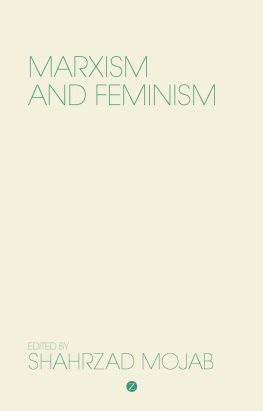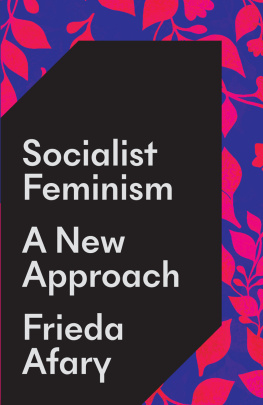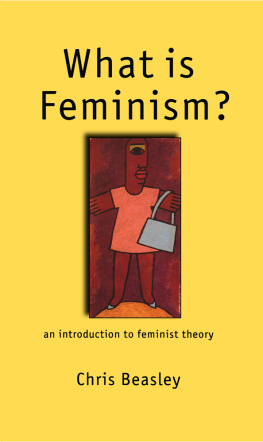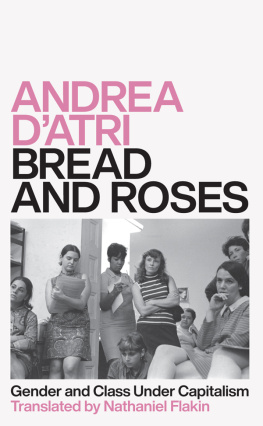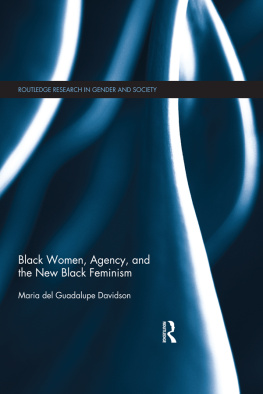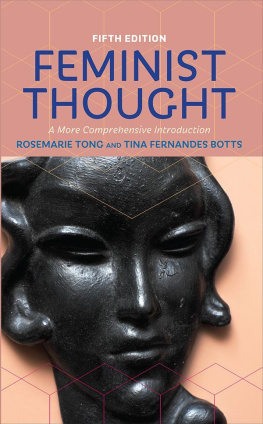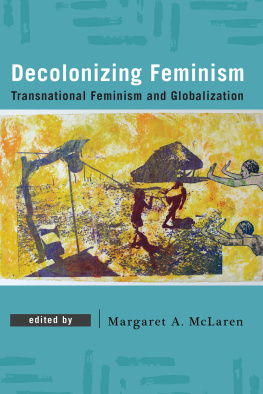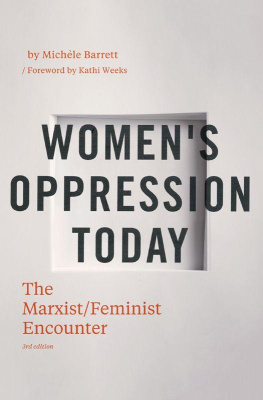
About the editor
Shahrzad Mojab is professor in the Department of Leadership, Higher and Adult Education and is the former director of the Women and Gender Studies Institute at the University of Toronto. Her areas of research and teaching include educational policy studies; gender, state, diaspora and transnationality; women, war, militarization and violence; feminism, anti-racism, colonialism and imperialism; and Marxism, feminism and revolution.
MARXISM AND FEMINISM
edited by Shahrzad Mojab

Zed Books
LONDON
Marxism and Feminism was first published in 2015 by Zed Books Ltd, 7 Cynthia Street, London N1 9JF, UK
This ebook edition was first published in 2015
www.zedbooks.co.uk
Editorial copyright Shahrzad Mojab 2015
Copyright in this collection Zed Books 2015
The right of Shahrzad Mojab to be identified as the editor of this work has been asserted by her in accordance with the Copyright, Designs and Patents Act, 1988
Set in FFKievit and Monotype Plantin by Ewan Smith, London
Index:
Cover designed by Liam Chapple
All rights reserved. No part of this publication may be reproduced, stored in a retrieval system or transmitted in any form or by any means, electronic, mechanical, photocopying or otherwise, without the prior permission of Zed Books Ltd.
A catalogue record for this book is available from the British Library
ISBN 978-1-78360-323-7 hb
ISBN 978-1-78360-322-0 pb
ISBN 978-1-78360-324-4 pdf
ISBN 978-1-78360-325-1 epub
ISBN 978-1-78360-326-8 mobi
CONTENTS
Shahrzad Mojab
Frigga Haug
Frigga Haug
Himani Bannerji
Sara Carpenter
Jamie Magnusson
Himani Bannerji
Judith Whitehead
Delia D. Aguilar
Helen Colley
Amir Hassanpour
Kumkum Sangari
Michelle Murphy
Maryam Jazayeri
Cynthia Cockburn
Teresa L. Ebert
ACKNOWLEDGEMENTS
This collection is the outcome of many conversations with the contributors, sometimes one on one but most often collectively and over many months, years and decades. I am enormously grateful to them for enriching my feminist understanding of Marxism and Marxist centring of class in feminism. Thanks are also due to graduate students who prodded me to keep on organizing radical or Marxist reading groups where we discussed and thought through concepts/keywords covered in the book. A summer Marxist theory group, held in Europe over the last few years, has been a valuable reading and discussion space. In this group, I learned to read dialectical and historical materialism as science, philosophy, method and, most significantly, as a mode of understanding and interpreting Marx and feminism. My gratitude to all participants for sitting through hours of debate and for their palpable love for humanity and revolution.
I am grateful to Stephan Dobson for his superb editorial work, his intellectual generosity, his affection for books, and for always walking in with yet another book for me to read! Shirin Haghgous diligent work on the preparation of the manuscript was indispensable; I owe her gracious thanks. Philip Tauchers assistance with Frigga Haugs chapters is greatly appreciated. I am also grateful for his creative contribution to the website Marxism and feminism: research, teaching, and praxis (. Special gratitude is due to Kim Walker, the enthusiastic and supportive editor at Zed Books.
The constructive comments by anonymous reviewers on the manuscript proposal certainly improved its content, for which I am grateful. I also thank Palgrave Macmillan, publisher, for permission to reprint Himani Bannerjis chapter Building from Marx: reflections on race, gender and class. I am indebted to Teresa L. Ebert for advancing the theorization of materialist feminism and to Paradigm Publishers for permitting the reprint of her chapter Gender after class as the Epilogue for this book. I am most grateful to Frigga Haug, who kindly permitted us to publish her two important chapters, Gender relations and The Marx within feminism. With all the support and assistance that I have received in preparing this collection, certainly any errors remaining are mine.
1 | INTRODUCTION: MARXISM AND FEMINISM
Shahrzad Mojab
Histories, theories and possibilities
This book goes to press in 2014, the centenary of the Great War in which capitalist states brought immense destruction of life and property to every corner of the world. Another world war recurred on a more destructive scale within the lifespan of a generation, and it has continued to our day in an area extending from the Balkans to the Middle East to Africa, and it threatens other parts of the world. While states, media, academia and many non-state organizations have a stake in commemorating the First World War, it is unlikely that anyone will remember what Mary White Ovington (18651951), a socialist and feminist, said four months before the launch of the mass slaughter:
Socialism and Feminism are the two greatest movements of to-day. The one aims to abolish poverty, the other to destroy servitude among women. Both are world movements. No matter how backward the nation may be that you visit, you will find your revolutionist there preaching that poverty is unnecessary, and that a great organization is working to destroy private capital and to build a co-operative commonwealth. And throughout western civilization, and even in the heart of the Orient, you also find the woman revolutionist telling her enslaved sisters of the effort among women to attain their freedom, to gain the right to live, not according to mans, but according to their own, conception of happiness and right. Ideas fly swiftly about the globe, and we are learning to think on the lines not of family or nation or race but of common interests and common suffering. (: 143)
Ovington emphasized that the relation of Feminism to Socialism is a matter of profound importance to many women Socialists She was right. Three years earlier, socialist women had launched 8 March as International Working Womens Day (IWWD), and three years later the : 353).
Socialism and feminism have changed radically since Ovington, but her ideas, simple and significant as they are, remain on the agenda of many who yearn for an end to both poverty and servitude. The October 1917 revolution in Russia was for many the realization of this dream. This revolution made Marxism the dominant trend in the theory and practice of socialism, and divided the world into socialist and capitalist camps. However, in spite of great leaps towards womens emancipation, the socialist experiments of the last century came to an end when capitalism was restored first in the Soviet Union (1956) and, within two decades, in China (1976). Today, many advocates of capitalism seek to justify the way this socio-economic system produces wealth as well as poverty, hunger and destruction of the environment.
Feminisms trajectory has not been as tumultuous, but not quite dissimilar either. Unlike Marxism, which rose to state power and guided the construction of socialism for a few decades in a number of countries, feminism contributed prominently to reforming patriarchy ).
The interest in merging the theoretical positions of Marxism and feminism, which has not subsided since the beginning of the last century, is fuelled by their prominence as two major emancipatory projects. This political affinity is, however, constrained by divergent theoretical commitments that are themselves political and ideological. Theoretically, Marxism and feminism have never been so far apart as at present.
Next page
